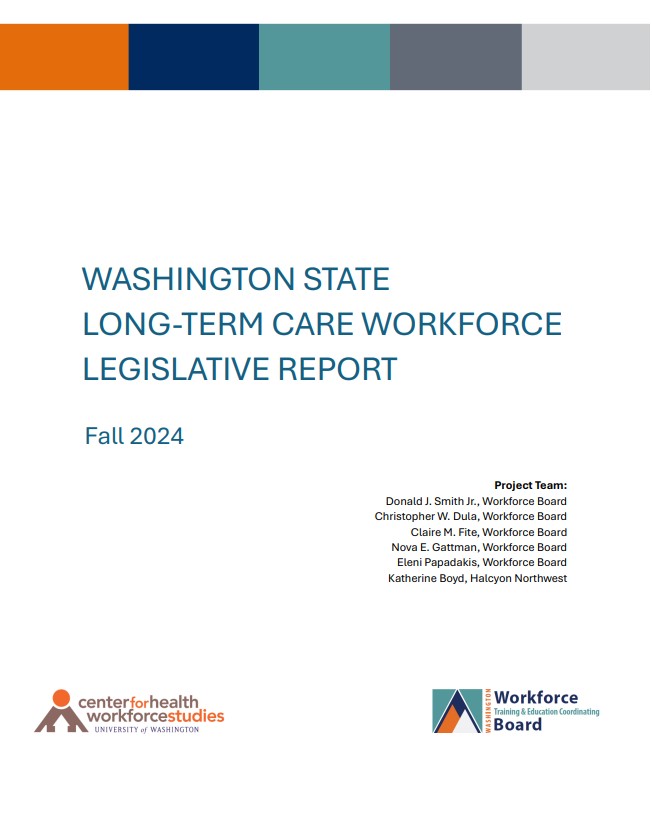Long-Term Care Workforce
Developing a Strategy for a Stable, Sustainable Workforce
Long-Term Population Trends
The growing demand for long-term care (LTC) service workers continues to be a significant concern of industry leaders, policymakers and communities who recognize the challenges of providing safe, quality care for a diverse population of Washingtonians. Developing and maintaining a well-trained long-term support services workforce with a focus upon an aging population, individuals with intellectual and developmental disabilities, survivors of catastrophic illnesses and injuries, and persons with dementia related health concerns remains the concern of officials across the state and nation. Many of the care needs are currently being met by paid and unpaid caregivers, many of whom are immediate family members.
As the longevity of older persons continues to increase, the need for LTC will continue. According to a 2015 United Nations report, the number of older persons aged 80 and above is estimated to grow from 125 million in 2015 to 434 million in 2050. A decade later, a 2025 WHO report validates the United Nations report, predicting growth in the population of individuals 80 years or older will reach 426 million in 2050.
Coincidentally with the rise in life expectancy and the growth in the number of older persons, the incidence of mental health diseases such as dementia and Alzheimer’s continues to grow. Around the world, the incidence of dementia is projected to grow from 47 million in 2015 to 75 million in 2030. In the United States, nearly 40 percent of the population aged 85 years and older suffer from Alzheimer’s and dementia. A 2025 report prepared by the Dementia Action Collaborative reports that approximately 156,000 people are living with Alzheimer’s disease or other dementias in Washington. By 2040, that number is expected to be more than 270,000.
A Department of Social and Health Services (DSHS) report with information from the American Community Survey (2022) indicates the following:
- Over 1 million individuals with disabilities reside in Washington State, representing 13.5 percent of the state’s population (U.S. Census Bureau, 2023).
- There are 435,323 individuals experiencing cognitive difficulties. Individuals with intellectual or developmental disabilities are a subset of the overall population of individuals with disabilities.
- In 2023, the DSHS Home and Community Living Administration, Developmental Disabilities Community Services carried a caseload of 54,533 individuals.
Finally, individual survivors of catastrophic illness and injuries (i.e. traumatic brain injuries) experience comparable care needs. A 2025 report by the Washington State Institute for Public Policy describes the LTC needs of persons with traumatic brain injury. The report suggests that as many as 180,000 Washington residents are survivors of a traumatic brain injury and need LTC services.
National Center on Aging (NCOA) Peer Learning Collaborative
The Workforce Board and Home and Community Living Administration are participating in a national program with subject matter experts from NCOA who are contributing to the state’s LTC and Direct Care workforce initiatives. The state of Washington was one of approximately 20 states chosen to participate in the program. Work with the NCOA and the Direct Care Worker Strategy Center began officially in August of 2025. In October 2025, a formal workplan was submitted to the NCOA. The plan builds on the foundational work of state agencies, educators, employers and labor groups who are actively engaged in the on-going LTC workforce collaboration.
Long-Term Care Workforce Collaborative (LTCC)
Under the Workforce Board’s leadership, the LTCC is pursuing opportunities that address industry challenges, public perception about LTC work, relatively low salary / benefits for workers, and safety and work-life issues that surfaced during the COVID-19 pandemic. The LTCC includes professionals from education and training programs, business communities, healthcare providers, state and federal agencies, elected officials, direct care workers, and other interested contributors who are considering a range of traditional and innovative solutions to the LTC workforce challenges.
Research Efforts supporting the LTC Workforce Initiative
The LTCC is supported by on-going research with a focus on meeting the LTC workforce needs. A multi-dimensional research team draws upon contributions from state agencies, educational institutions, employers, students and non-government agencies. Local, state, national and international representatives identify and examine factors that influence workforce stability, exploring innovative efforts to impact the workforce needs of the state and evaluate the impact of existing efforts. Finally, the findings derived from the research are a key component of the annual reports used to inform elected officials and policymakers about the status of the LTC Workforce and future needs.
Join the LTC Workforce Collaborative
If you are interested in participating in the LTCC or would like more information, contact LTC Workforce Policy Manager Dr. Donald Smith at donald.smith@wtb.wa.gov, or Michelle Pierce at michelle.pierce@wtb.wa.gov.
Long-Term Care Collaborative
Long-term care covers a wide range of services and situations from in-home help with basic activities of daily life such as bathing, dressing, meals and/or more complex healthcare related services, attendance at day care centers, to care within an institutional setting.


